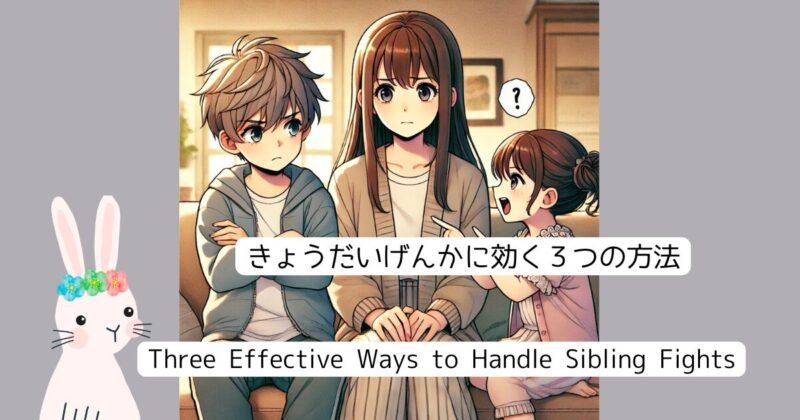- ◇お知らせ
- 新着の記事のお知らせを受け取る
- Sign up to receive email nortifications about new articles.
- 子どもを怒らず育てたいのに、ついイライラしてしまう…。
- 1. 子どもと“ちょうどいい距離”を取る
- 2.子どもとの関係を育む5つの行動
- さいごに|今そばにいてくれる奇跡に感謝して
- 5 Tips for Treating Your Children Gently: Creating Kinder Parent-Child Relationships
- ◇ Announcement
- 新着の記事のお知らせを受け取る
- Sign up to receive email nortifications about new articles.
- You want to raise your kids without yelling, yet find yourself getting frustrated…
- 1. Keep a “Just-Right” Distance from Your Child
- 2. Five Actions to Foster a Gentle Relationship with Your Child
- Final Thoughts: Gratitude for This Moment
- 新着の記事のお知らせを受け取る
- Sign up to receive email nortifications about new articles.
◇お知らせ
こんにちは、今日もブログに遊びに来てくださって、ありがとうございます!
新着記事がアップされるとメールでお知らせする機能を追加しました。
記事を気に入ってくださったら、ぜひ登録をお願いいたします^^
子どもを怒らず育てたいのに、ついイライラしてしまう…。
ママ友から「どうしてそんなに丁寧に接していられるの?」と聞かれることがあります。
でも、最初からうまくできていたわけではありません。
初めての育児は、まさに手探りで自分の感情に振り回される毎日。
もっと寄り添えたらよかったなと、長男の小さかった頃を思い返すことがあります。
それでも3人の子どもと一緒に過ごす中で、わたしの中に1つの軸が育ちました。
それが 「子どもとちょうどいい距離を取る」という考え方です。
この記事では、怒りすぎて後悔しないためのヒントとして、
- 子どもとどう向き合うかの“考え方”
- 穏やかに接するための“5つの行動”
を、わたし自身の体験をもとにお伝えします。
忙しい毎日でも、心を乱されず子どもに優しくできる。そのヒントを見つけてもらえたら嬉しいです。
1. 子どもと“ちょうどいい距離”を取る
わたしが意識しているのは、「子どもは自分のものではない」と心に線を引くことです。
もちろん、わたしは子どもたちが大好きです。でも同時に、彼らはわたしの所有物ではありません。
この感覚が持てるようになってから、「思い通りに動かしたい」「感情で叱りつけてしまう」といったことがぐっと減りました。
心の中で一線を引くことで、子どもを尊重する姿勢が自然と身についた気がします。
考え方1.「子は授かりもの」という視点
成人式の夜、机に父からの手紙が置いてありました。手紙の中にこんな一文がありました。
「成人の日」はお父さんにとっては、天から授かった子を社会に還す決断の日と受け止めています。
自分が母親となった今、そのパートを読み返して改めて思います。こんなにも愛らしくて、こんなにも近くにいてくれてる子どもたち。でもいずれ旅立ってしまうのです。その日までたっぷりの愛情を注ぎながら、一緒に過ごせる毎日を大切にしたい。そう思うようになりました。
考え方2.Kahlil Gibranの詩が教えてくれたこと
アメリカ人の友人から、ある詩を教えてもらいました。
彼女のお父様が、実家を出る日にプレゼントしてくれた大切な詩なのだそうです。
以下、Kahlil Gibran『The Prophet』の中の詩「On Children」の原文を引用し、私自身の訳とともに紹介します。
on children
Your children are not your children.
They are the sons and daughters of Life’s longing for itself.
They come through you but not from you,
And though they are with you yet they belong not to you.
あなたの子どもたちはあなたの子どもではない。
彼らは、生命が自らを望んだ結果として生まれた息子であり娘である。
彼らはあなたを通じて生まれて来たが、あなた自身が生み出したものではない。
彼らはあなたと一緒にいるが、あなたの所有物ではない。
You may give them your love but not your thoughts,
For they have their own thoughts.
You may house their bodies but not their souls,
For their souls dwell in the house of tomorrow, which you cannot visit, not even in your dreams.
You may strive to be like them, but seek not to make them like you.
For life goes not backward nor tarries with yesterday.
愛を与えるのは良いが、考えを押し付けてはいけない。
彼らには彼らの考えがあるのだから。
彼らの体を家に迎えることは良いが、心を囲ってはいけない。
彼らの心は明日の家にあるのだ。そこにはあなたは行くことができない、夢の中であったとしても。
あなたが彼らのようになろうと努力するのは良いが、彼らをあなたのようにしようとしてはいけない。
人生は後戻りしたり、昨日に留まっておけるものではないのだ。
You are the bows from which your children as living arrows are sent forth.
The archer sees the mark upon the path of the infinite, and He bends you with His might that His arrows may go swift and far.
Let your bending in the archer’s hand be for gladness;
For even as He loves the arrow that flies, so He loves also the bow that is stable.
生ける矢である子どもたちを前に送り出す、あなたは弓なのだ。
射手は無限に続く道にある目印を見定め、あなたを力いっぱい曲げ、矢を速く遠くへ送り出す。
射手の手においてあなたが曲げられることを、喜びとして受け入れなさい。
射手は飛んでいく矢を愛している、それと同様に丈夫な弓を愛しているのだから。
※この詩に登場する「射手」は、私は神を象徴していると受け取っています。
—————-
子どもは“自分のもの”ではない。これは、感情をぶつけないための一番の土台
子どもたちとの距離感を思い出すのに最適な詩だと思い、詩を手書きして壁に貼って、毎日 口に出して読んでいます。

読むことで自分の心の軸が整い、心に刻まれていく気がします。
この詩をシェアしてくれた友人に感謝します。いつもありがとう。
2.子どもとの関係を育む5つの行動
子どもたちと穏やかに生活するために、日々わたしが気をつけていること5選を紹介します。ちなみに子どもたちの兄弟げんかについてはこちらの記事をご覧ください。
大前提として、とにかく愛情をたっぷり与えたいと考えています。日頃から愛情で心が満たされていれば信頼関係も築けますし、叱ることがあっても受け止めてもらえると思います。
2-1.愛情の言葉はストレートに伝える
褒めることは「心の栄養」
アメリカで暮らしていた頃、子どもを褒めることについて、本当にたくさんのことを学びました。とにかく褒め言葉のバリエーションが多いし、ポジティブな言葉が飛び交うアメリカの文化が大好きです。
「Awsome!」とってもいいね
「I’m proud of you」あなたを誇りに思うよ
「Amazing!」すごい!
「Incredible」信じられないほどすごい
「You’re talented」才能があるね
などなど。
アメリカの方々は、日本と違い、人前でも自分の子どものことを褒めます。日本の謙遜の文化、「いやいや、うちの子なんて全然〜」みたいなやり取りは一切ありません。
日本人としては少し照れくさい感じもしますが、愛情を言葉でしっかり伝えれば、子どもの心を愛情で満たすことができます。
また、愛のこもった言葉に触れることで、子ども自身も愛情を伝える語彙を育んでいきます。きっと、子どもたちも周りの人に愛情を伝えられる人になるはずです。
わたしも積極的に言葉で伝えるようにしたら、3歳の娘が「わたしはおかあさんのたからもの〜」と言ってくれるようになりました。ちゃんと伝わってる…と感動します。
照れくさいなら絵本を活用しよう
ストレートに言葉を伝えるのが恥ずかしい時は、絵本を使うとハードルが下がります。
絵本の言葉を読んで「この本のお母さんと同じ気持ちだよ」と言えば、自然に想いを伝えられます。
おすすめの絵本です↓
2-2.朝の時間を“無条件の愛”で始める
「条件付きの愛」を避けるためのシンプルな習慣
テストでいい点をとった時だけ褒める、いい子にしてたら褒める…
そんな「条件付きの愛情」は、子どもにとってはプレッシャーになりがちです。
「あなたの存在自体が大切なんだよ」と伝えるため、わたしは朝起きてすぐの時間を愛情を伝える時間にしています。朝、娘を起こすときは娘の顔にチュウしながら「おはよう、だいすきだよ」と声をかけます。自分で起きてくる息子たちにも「おはよう」と言ってハグしたり、顔や背中をなでたりしてます。
2-3.怒らず叱る|3つのコツ
目を見る/短く伝える/感情を添える
怒らない=何でも許す、ではありません
わたしが叱る時に気を付けるポイントは3つあります。
①目を見る→お母さんは真剣だと伝える
②短く伝える→叱る理由、どうしてほしいかを短く伝える
③感情を添える→「悲しい」「イヤだった」などの自分の気持ちを伝える
例)「今あなたが兄ちゃんを叩いたのを見て、お母さんはとっても悲しかった。あなたのことも兄ちゃんのことも、お母さんは大好きだからだよ。今度からは『貸して』って言葉で伝えてくれる?」(しっかり目を見て、手を握りながら)
日常のルールを“歌”で楽しく伝える工夫も紹介
余談ですが、ささいなことだけど、子どもにしてほしいことや守ってほしいルールってありますよね。何回も小言を言い続けるのって大変だし、言う方も言われた方もハッピーな気分にはなりません。そこで、わたしはそういう時は歌って伝えています。
我が家では、お皿を水につけ忘れがちな次男のためにこんな歌を作りました。
♪おーーさーーらーー、水に、つけて、ほしーーいのー、水に、つけて、ほしーーのー♪
これが大ウケ。
歌えばハッピーだし、聞いた方は耳と記憶に残るし、良い感じです。
ついに次男がお皿を水につけてくれるようになり、こんな歌も誕生しました。
♪おーーさーーらーー、水に、つけたね、ありがとう!水に、つけたね、ありがとう♪
2-4.怒りそうになったらこうする
「80%イライラ宣言」で協力を引き出す
時にはイライラが溜まってしまうことも、もちろんあります。
その時は感情が爆発する前に「お母さん、今80%くらいイライラが溜まってるよ!100%にならないように、ちょっと協力してくれる?」と助けを求めることにしています。
もちろん子どもたちと少し離れて、トイレに行って、心を落ち着けるというのもアリです。でも結局は子どもたちに自分の感情を理解してもらって、協力してもらわないと解決には向かわないですよね。
2-5.怒ってしまったら、素直に謝る
親も完璧じゃない。だからこそ「謝る姿」を見せる意味
感情的に怒ってしまった!あんなに気を付けていたのに、と自己嫌悪に陥ります。そんな時は素直に謝ります。
「あんな言い方をしてごめんね。許してくれる?」
「違う言い方があったのにね、悲しかったよね、ごめんね」
親が謝る姿を見せることも、子どもの心を育てる大事な時間だと思っています。
以前、長男を感情的に怒ってしまったあと、友だちにそのことを打ち明けながら、大泣きしてしまいました。その友だちはこう言ってくれました。
「完璧な親なんていないよ。大事なのは謝ること。」
あの時の友だちの優しさは今でも忘れません。彼女の言葉に勇気をもらい、長男が帰宅後に誠意を持って謝ったら、ちゃんと受け止めてくれました。
さいごに|今そばにいてくれる奇跡に感謝して
子どもたちは、いつか大人になって社会へ旅立っていく存在。
だからこそ、今 一緒にいられるこの時間は、奇跡のように尊いものだと思います。毎日が完璧じゃなくても、うまくいかない日があっても大丈夫。
心の距離感を整えて、小さな愛情を丁寧に積み重ねていければそれでいい。今日もまた、あなたのご家庭があたたかく、にぎやかで、笑顔あふれる一日になりますように。
またブログでお会いできるのを楽しみにしています。
5 Tips for Treating Your Children Gently: Creating Kinder Parent-Child Relationships
◇ Announcement
Hello, and thank you for visiting my blog again today!
I’ve added a new feature where you can receive email notifications when new posts are published.
If you enjoy this article, please consider subscribing! 🙂
You want to raise your kids without yelling, yet find yourself getting frustrated…
Sometimes other moms ask me, “How can you stay so calm and gentle with your kids?”
But the truth is, I didn’t start out this way.
When I became a mother for the first time, I was fumbling through everything, overwhelmed by my emotions each day.
Looking back on when my eldest son was little, I often wish I could have been more present and gentle.
Still, after raising three children, one clear principle has taken root in me:
The importance of maintaining just the right emotional distance from your child.
In this article, I’ll share two key ideas and five specific actions based on my own experiences to help you interact with your children more calmly and regret less.
Even on the busiest days, I hope you’ll find hints to stay centered and treat your children with kindness.
1. Keep a “Just-Right” Distance from Your Child
One mindset I try to keep is to draw a line in my heart that says, “My child is not my possession.”
Of course, I love my children deeply. But they are not mine to control or own.
Once I embraced this idea, I found myself less likely to want to force them to act a certain way or lash out emotionally.
Setting this mental boundary naturally helped me treat them with more respect.
Mindset 1: Children Are a Gift
On the night of my Coming-of-Age Day (a Japanese rite of passage), I found a letter from my father on my desk. One line stood out:
“To me, Coming-of-Age Day is the day a father returns the gift he received from the heavens back to society.”
Now that I’m a parent, those words resonate deeply.
These children who are so close and so lovable—they will someday leave the nest.
Until that day, I want to cherish every moment with them, showering them with love.
Mindset 2: A Poem by Kahlil Gibran
An American friend once shared a poem that her father had given her when she left home.
It’s from Kahlil Gibran’s The Prophet, titled On Children. Here is an excerpt:
On Children
Your children are not your children.
They are the sons and daughters of Life’s longing for itself.
They come through you but not from you,
And though they are with you yet they belong not to you.You may give them your love but not your thoughts,
For they have their own thoughts.
You may house their bodies but not their souls,
For their souls dwell in the house of tomorrow, which you cannot visit, not even in your dreams.
You may strive to be like them, but seek not to make them like you.
For life goes not backward nor tarries with yesterday.
You are the bows from which your children as living arrows are sent forth.
The archer sees the mark upon the path of the infinite, and He bends you with His might that His arrows may go swift and far.
Let your bending in the archer’s hand be for gladness;
For even as He loves the arrow that flies, so He loves also the bow that is stable.
This poem is a powerful reminder that our children are not our possessions, which forms the foundation for not projecting anger onto them.
I’ve handwritten it and posted it on the wall to read aloud daily—it helps ground me emotionally.

2. Five Actions to Foster a Gentle Relationship with Your Child
Here are five habits I practice every day to live peacefully with my children.
For tips on handling sibling fights, please check another post linked here.
First and foremost, I want to shower them with love.
When children feel secure in your love, they trust you—and even when you need to reprove them, they will receive it.
1. Express Your Love Clearly and Frequently
Praising is nourishment for the heart.
When we lived in the U.S., I learned so much about the power of praise and positive language:
- “Awesome!”
- “I’m proud of you.”
- “Amazing!”
- “Incredible!”
- “You’re so talented.”
Unlike in Japan, Americans freely praise their children in public. There’s no humble downplaying like “Oh no, my child’s nothing special.”
Even if it feels a bit awkward at first, expressing love clearly fills your child’s heart—and helps them develop vocabulary to express love, too.
My 3-year-old daughter now says, “I’m Mommy’s treasure!” It really shows it’s getting through.
If you’re shy, use picture books.
Reading loving stories and saying, “I feel just like the mom in this book,” is a great way to communicate your love naturally. Here’s a picture book I love and recommend↓
2. Start the Morning with Unconditional Love
To avoid showing “conditional love” (e.g., only praising good behavior or achievements), I use mornings to show love just for being.
I greet my daughter with a kiss and “Good morning, I love you.”
I hug my sons and stroke their backs or faces as I say good morning.
3. Discipline Without Anger: 3 Tips
Not yelling doesn’t mean letting everything slide.
When I need to discipline, I focus on three things:
- Make eye contact – to show I’m serious.
- Keep it brief – state the reason and what I want them to do.
- Add emotion – share how I felt (e.g., “That made me sad”).
Example:
“I saw you hit your brother. That made me really sad. I love both of you very much. Next time, can you say ‘Please’ with words instead?”
Pro Tip: Use Songs for Everyday Rules
For my middle son who forgets to soak his dishes, I made up a silly song:
♪ Please soak your plate in water ♪
♪ It would really help me out ♪
It stuck! He started soaking his plates, and now we sing a thank-you version:
♪ Thanks for soaking your plate ♪
♪ It means a lot to me ♪
4. When You’re About to Snap, Try This
When frustration builds, I say:
“I’m about 80% irritated right now! Can you help me before it hits 100%?”
Asking for cooperation before emotions explode helps.
Taking a break (like a bathroom time-out) also works—but long-term, sharing your feelings is key to building understanding.
5. When You Do Lose It, Apologize Honestly
Parents aren’t perfect. When I blow up, I apologize sincerely:
- “I’m sorry I said that. Will you forgive me?”
- “I should’ve spoken differently. I know it hurt. I’m sorry.”
Apologizing teaches children emotional honesty.
Once, after I lost my temper with my eldest, I cried to a friend who gently said:
“No parent is perfect. What matters is apologizing.”
Her kindness gave me the courage to make amends—and my son accepted it.
Final Thoughts: Gratitude for This Moment
Someday, our children will grow up and move into the world.
That’s why the time we share now is so precious—it’s almost miraculous.
It’s okay if every day isn’t perfect.
As long as we keep healthy emotional boundaries and steadily share our love, that’s enough.
Wishing your home a warm, joyful, laughter-filled day.
I look forward to seeing you on the blog again soon!





コメント